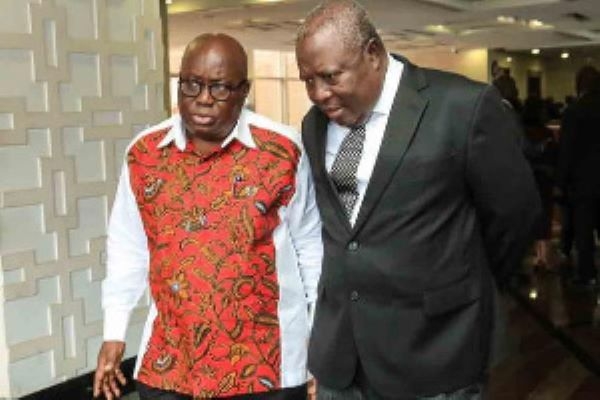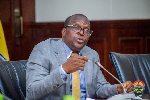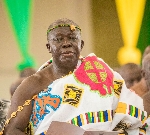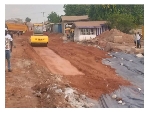Amidu’s resignation disappointing – OccupyGhana®
 According to the group, the acceptance of Mr Amidu’s resignation by the President makes it “impossible for the decision to be rescinded.”
According to the group, the acceptance of Mr Amidu’s resignation by the President makes it “impossible for the decision to be rescinded.”
Pressure Group OccupyGhana® has expressed disappointment with the resignation of Special Prosecutor Martin Amidu and the subsequent acceptance of his resignation by President Nana Addo Dankwa Akufo-Addo.
According to the group, the acceptance of Mr Amidu’s resignation by the President makes it “impossible for the decision to be rescinded.”
Reacting to the resignation of Mr Amidu in a statement, OccupyGhana indicated that together with Ghanaians, it was “happy when Mr Martin Amidu, based on his impeccable credentials, was nominated, vetted and appointed to the position, and we have keenly followed developments relating to the office after he was appointed.”
The group explained that it “believed that of all the provisions in the OSP Act, probably the most important is section 4(1) which guarantees the independence of the office in the following words: “Except as otherwise provided in the Constitution, THE OFFICE IS NOT SUBJECT TO THE DIRECTION OR CONTROL OF A PERSON OR AN AUTHORITY in the performance of the functions of the Office” [emphasis ours.]”
OG also said it “believes that the grant and assertion of this independence is at the foundation of the entire Special Prosecutor experiment. It is in similar words that the Constitution guarantees the independence of the Judiciary and other Constitutionally-Established Independent Bodies such as the Auditor-General and Electoral Commission”.
“It is our firm belief that those words vest in those relevant bodies political, financial and administrative independence from government and any other person or authority. This is what led us to successfully apply to be allowed to file an Amicus Brief in the pending case of ISAAC WILBERFORCE MENSAH V AUDITOR-GENERAL & 2 OTHERS (SUIT NO J1/2/2019). We await the final judgment of the Supreme Court on that matter.
“Outside the Constitution, we note that Parliament has recognised that such independence is a critical attribute for certain national institutions. It has therefore deployed the same words in several statutes to grant independence to critical institutions and entities such as Commissions of Inquiry, Bank of Ghana, Public Utilities Regulatory Commission, National Petroleum Authority, National Peace Council, Legal Aid Commission, Witness Protection Commission, and the recently established Right to Information Commission. The OSP is part of this list of entities.”
The group further noted: “The meaning of those words are not in doubt. In October 1992, which was even before this Constitution came into force, the High Court held in BILSON V RAWLINGS [1993-94] 2 GLR 413 that those words “explicitly give complete independence from government.
“However, while the Constitution or statute may “give complete independence from government,” we expect that the persons appointed to those offices would also assert that independence whenever it is challenged. Without that, the legal provisions that grant independence would be meaningless, the offices would be surrendered to government control, and Ghana would be the ultimate loser for it.”
It continued that after perusing Mr Amidu’s letter, it believes that “the main challenge had to do with his interaction with the Executive on his most recent corruption risk assessment report. Without commenting on the merits or otherwise of the matters in disagreement, we believe that Executive push back is to be expected in the work on all constitutional or statutory independent bodies. When it becomes an attempt to creep on turf, we believe the best option is to call the bluff of the Executive, assert the independence, stick to one’s guns and proceed with one’s mandate. If we do not do this then we have surrendered that precious independence, back to the Executive.”
The group restated its support for “the OSP and its independence from every other person or authority” noting that “the purpose behind all of these independent institutions under the law is to preclude the exercise of arbitrary power.”
It continued: “We expect there to be friction. Inherent in that inevitable friction is the expectation that each office holder would hold their ground so that in the healthy equilibrium of tension, Ghanaians would be protected from undue governmental authority.”
It added: “That is why we are disappointed in both the resignation and its subsequent acceptance, which make it impossible for the decisions to be rescinded.”
Mr Amidu resigned effective Monday, 16 November 2020.
According to him, President Nana Akufo-Addo was interfering with the performance of his duties in relation to the corruption and anti-corruption risk assessment he did on the controversial Agyapa Royalties Transaction.
Mr Amidu said the President attempted to convince him to include a response from Finance Minister Ken Ofori-Atta in his report, which he declined because “that would have compromised my independence as the Special Prosecutor.”
Mr Amidu, in his corruption and anti-corruption risk assessment report on the Agyapa deal, said the Transaction Advisor(s) involved in the deal were susceptible to “nepotism, cronyism and favouritism”.
In his resignation letter addressed to the President, the Special Prosecutor further disclosed that Nana Akufo-Addo wanted him to “shelve” the report on the Agyapa deal.
He wrote: “I also refused to shelve my report to enable you handle the matter, which explains my press release to the public on the morning of 2 November 2020 and the follow-up with the distribution of the full 64-page Agyapa Royalties Transactions Anti-corruption Assessment Report to the Public.”
He further explained: “Unbeknownst to you that I had published the full 64-page report to the public, you caused a press statement to be made based on my letter dated 16 October 2020 to you under reference which sought to politicise and downplay the seriousness of the professional analysis of the risk of corruption and anti-corruption assessment reported by my office”.
“It, thus, became abundant clear to me that I cannot continue under your government as the special prosecutor because we disagree with the non-partisan independence of the special prosecutor in the performance of the functions of my office in preventing and fighting corruption and corruption-related offences.”
The President subsequently accepted his resignation on Tuesday, 17 November 2020.
Source: classfmonline.com
Trending News

7-11pm dumsor attributed by ECG to overloaded transformers false – PURC
06:21
Mahama is not ready to be president, vote for Bawumia – Nana Kay
02:02
Tesla recalls thousands of Cybertrucks over jammed accelerator issue
13:16
Expand the policy space beyond the executive arm of gov't - Bagbin to Dev't partners
14:23
BVR theft: NDC demands impartial, independent probe
02:36
Late Komla Dumor’s elder sister, Mawuena Trebarh, dead
00:55
Galamsey: Birim North Security Council warns galamseyers to leave in 72 hours
10:33
Let's diversify VRA, ECG – Otumfuo tells gov't
14:10
'No one above the law!': Court orders CID boss' arrest for 'blatant' disregard of summonses
01:47
Ejisu roads see massive overhaul ahead of by-election
09:52



